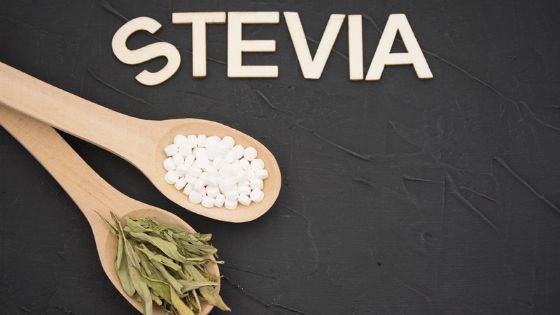How long does stevia stay in your body? The Truth!

Have you ever wondered, "how long does stevia stay in your body"? Stevia is a natural, zero-calorie sweetener gaining popularity as an alternative to sugar. But how long does it take for the body to process and metabolize stevia?
This article will explore the answer to this question and provide some tips on using stevia safely. So if you're looking for information on how long stevia stays in your system, keep reading!
How long does stevia stay in your body?

Stevia can remain in your body, specifically the bloodstream, for up to 20 hours after consumption. As a result, it is quickly absorbed and broken down into its components.
The glucosides in stevia are metabolized by enzymes in the small intestine and transported to the liver before they enter the systemic circulation.
Research indicates that stevia is eliminated easily within 4-6 hours after intake due to its short half-life of 1–2 hours.
Since it does not require extensive metabolism before being excreted from the body, it has a relatively low bioavailability of only 3–9%.
Furthermore, it displays no toxic effects on long-term human health, as studies have concluded that chronic ingestion of high doses causes no adverse events or side effects.
Stevia (steviol glucuronide) is passed through the kidneys and comes out in the urine. Therefore, there is no accumulation of steviol glycosides in the body.
Anything that you eat or drink is excreted through your urine or poop. Stevia does not stay in your body; research shows it helps the body make insulin.
What is Stevia and its Benefits?
Stevia is a natural sweetener derived from a plant of the same name. It is up to 300 times sweeter than sugar and has zero calories.
In addition to its low-calorie count, stevia contains beneficial compounds that can help promote health. These include antioxidants, anti-inflammatory agents, and minerals such as magnesium, zinc, and chromium.
It may be used in place of sugar to enhance sweetness without causing an increase in blood glucose levels.
It has been linked to several potential health benefits, including improved liver function, reduced inflammation, weight loss aids, and even improved cognitive functioning. Additionally, it's important to note that stevia does not contain any artificial flavors or colors.
The Metabolism of Stevia
The body processes stevia very quickly and efficiently. This is because it does not require extensive metabolism before being excreted from the body.
It is broken down in the small intestine into its components, then transported to the liver before entering the systemic circulation. Enzymes metabolize the glucosides in the small intestine, then pass through the kidneys and out of the body via urine or feces.
Stevia has a relatively low bioavailability of 3-9%, meaning it is completely metabolized within 4-6 hours after intake. Although there is no accumulation of steviol glycosides in the body, studies have concluded that chronic ingestion of high doses causes no adverse events or side effects.
Potential Side Effects of Consuming Too Much Stevia
Although stevia is generally considered safe, some people may experience digestive discomfort when consuming large doses.
These include bloating, gas, nausea, and diarrhea. Additionally, it should be noted that pregnant women should avoid consuming large amounts of stevia due to its sweetness and potential for overconsumption.
9 Tips for Safely Enjoying the Sweetness of Stevia
Tip 1
Look for stevia free of additives, such as sugar alcohols, artificial sweeteners, and preservatives.
Tip 2
When using stevia in recipes, start with a smaller amount than the amount of sugar called for since it is much sweeter.
Tip 3
Avoid highly processed forms of stevia, such as powder or liquid extracts. Try to use whole-leaf or granulated stevia instead.
Tip 4
Buy organic stevia whenever possible to reduce chemical exposure and support organic agriculture practices.
Tip 5
Use the smallest amount of stevia needed to achieve desired sweetness levels in food and drinks.
Tip 6
To reduce any bitter aftertaste associated with some forms of stevia, pair it with other natural sweeteners like honey or maple syrup when baking or cooking.
Tip 7
Be aware that different stevia brands can have varying sweetness levels—start small and increase as desired until you determine what works best for you.
Tip 8
Read labels carefully when purchasing packaged foods containing stevia to check the quality and quantity used to avoid high amounts of added sugars or artificial ingredients that may be combined with the sweetener.
Tip 9
If consuming large amounts of stevia products regularly, consider consulting with a healthcare professional about the potential health risks due to its intense sweetness compared with other natural sweeteners like honey, maple syrup, or coconut sugar.
Final words
In conclusion, the answer to how long stevia stays in the body is not very long. It is quickly absorbed and metabolized by enzymes in the small intestine, then transported to the liver before entering the systemic circulation.
Therefore, it has a short half-life of 1–2 hours and an even lower bioavailability of 3–9%. Additionally, it is eliminated from your body within 4-6 hours after consumption. If you have further questions or concerns about using stevia as a sugar substitute, consult a healthcare professional.
DISCLAIMER: buildyourbody.org does not provide medical advice, examination, or diagnosis.
Medically reviewed and approved by Nataniel Josue M D.
